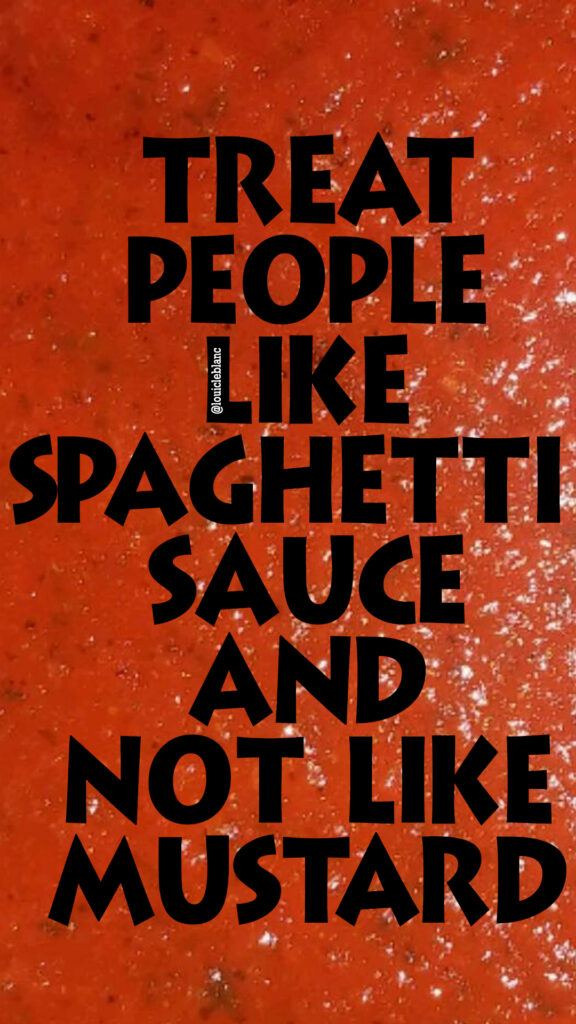I’ll disclose that most of this research was taken from a Malcolm Gladwell talk on the achievements made by Dr. Howard Moskowitz. This speaking engagement resonated with me on many levels. I’m sharing this with you in order for you to gain enlightenment.
….
For those unaware, Howard Moskowitz reinvented our thought process around taste through spaghetti sauce. He opened up people’s mind to the perfect “sauces” as opposed to the perfect “sauce.” In the late 70s and early 80s, there was a retail war over spaghetti sauces as citizens were opening-up their palette to food from other cultures like Italian, Mexican and Chinese. The dominant companies Prego and Ragu were in-battle over who had the better, more authentic product in the spaghetti sauce market. Their advertisements were widely popular and brutal against each other, which made for great tv when I was a child.
…..
Dr. Moskowitz analyzed various spaghetti sauces and through his research, he determined that Americans clustered around three types of spaghetti sauces that pleased their palette: plain, spicy and extra chunky. The data was shocking to everyone as through many years of conducting market research, not a single respondent ever mentioned that would enjoy an extra chunky spaghetti sauce.
……
It was hard to swallow, but the facts spoke for themselves as Prego reinvented their sauces based on his findings and produced a product line of extra chunky spaghetti sauce that immediately and completely took over the spaghetti sauce market. From that line alone, they made over $600 million dollars.
…..
From that mindset, capitalists took-over where we started to get seven different kinds of vinegar, 71 different kinds of olive oils and 14 different kinds of mustard. Even Ragu had to produce similar product lines to compete with the take-over. Today, we have close to 36 different Ragu spaghetti sauces available in supermarkets and each of them are available at the same price.
….
In contrast to that, we had two mustard giants, French’s and Gulden’s, which both were yellow mustards with some basic ingredients. When Grey Poupon came along with their Dijon mustard with much more volatile brown mustard seeds, a little white wine for that nose hit and packaged in a little tiny glass jar with a wonderful enameled label on it.
….
Instead of charging $1.50 for the 8oz bottle of yellow mustard, they went ahead and charged $4.00 for theirs. Again, their aggressive advertisements worked wonders on the masses as consumers bought into it to the point where Grey Poupon took over the mustard market.
….
This mindset flipped Moskowitz’s idea of a horizontal segmentation by creating a food hierarchy where consumers gain a false sense that they are purchasing better items; items with more sophistication, culture and meaning. Dr. Moskowitz was opposed as he didn’t believe that mustard existed on a hierarchy; instead, mustard existed just like tomato sauce on a horizontal plane.
….
There is no good mustard, no bad mustard; there’s no perfect mustard or imperfect mustard. There are only different kinds of mustards that suit different kinds of people. This idea fundamentally democratized the way we think about taste.
….
For years, we’ve been feed that what it took to make people happy was to provide them with the most culturally authentic version of the dish or meal. We need to move away from the search of universals to the understanding of variability.
….
When we pursue universal principles in food, we aren’t just making an error, we’re actually doing ourselves a massive disservice and by embracing the diversity of human beings, we will find a surer way to true happiness.
….
Let’s quit treating people like mustards where some are more sophisticated than others and separated them from other types of mustard. Instead, I propose that we all act like tomato sauces where we’re all on a horizontal plane embracing each other for our uniqueness and diversity.
#malcolmgladwell #tomatosauce #howardmoskowitz #blink #horizontalsegmentation




